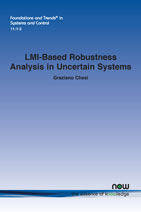LMI-Based Robustness Analysis In Uncertain Systems
By Graziano Chesi, Department of Electrical and Electronic Engineering, The University of Hong Kong, Hong Kong, chesi@eee.hku.hk
Abstract
The study of uncertain systems has undoubtedly played a primary role in the history of control engineering as unknown quantities are often present in the available mathematical model of a plant. This monograph aims to provide the reader with a unified framework for the fundamental and challenging area of robustness analysis of uncertain systems, where even the most basic problem of establishing robust stability may be still open due to complexity and conservatism even for a third order system linearly affected by a scalar parameter. The described framework is based on linear matrix inequalities (LMIs) and exploits polynomials that can be expressed as sums of squares of polynomials (SOS). The interest for this framework is motivated by several reasons, such as allowing to consider various types of uncertainties, providing guarantees for robust stability and robust performance, requiring the solution of convex optimization problems, allowing for trade-off between conservatism and complexity, and including a number of methods in the literature as special cases. Several numerical examples are also provided to illustrate the use and potentialities of the presented framework, shedding some light on what can be achieved and what cannot.
LMI-Based Robustness Analysis In Uncertain Systems
The study of uncertain systems has played a significant role throughout the history of control engineering due to unknown quantities often being present in the mathematical model of a plant. In this monograph the author provides a unified framework for the fundamental and challenging area of robustness analysis of uncertain systems, where even the most basic problem of establishing robust stability may be still present. This framework uses linear matrix inequalities (LMIs) to exploit polynomials that can be expressed as sums of squares of polynomials (SOS).
The author guides the reader through the motivations for using the framework including considering various types of uncertainties; providing guarantees for robust stability and robust performance; requiring the solution of convex optimization problems; allowing for trade-off between conservatism and complexity; and concluding with a number of special case methods.
This monograph can be used by researchers and students to understand the issues and use the numerical examples to identify the use of the framework in modern controls systems.
